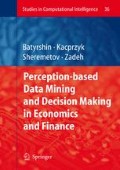Access this chapter
Tax calculation will be finalised at checkout
Purchases are for personal use only
Preview
Unable to display preview. Download preview PDF.
References
B. De Baets and H. De Meyer, Transitivity frameworks for reciprocal relations: cycle-transitivity versus F G-transitivity, Fuzzy Sets and Systems 152 (2005), 249-270
B. De Baets and H. De Meyer, On the cycle-transitive comparison of artificially coupled random variables, Journal of Approx. Reas. (2007), in press.
B. De Baets, H. De Meyer, B. De Schuymer, and S. Jenei, Cyclic evaluation of transitivity of reciprocal relations, Social Choice and Welfare, 26 (2006), 217-238
H. De Meyer, B. De Baets, and B. De Schuymer, Extreme copulas and the comparison of ordered lists, Theory and Decision (2006), online DOI 10.1007/511238-006-9018-y.
B. De Schuymer, H. De Meyer, B. De Baets, and S. Jenei, On the cycle-transitivity of the dice model, Theory and Decision 54 (2003), 264-285
B. De Schuymer, H. De Meyer, and B. De Baets, Cycle-transitive comparison of independent random variables, Journal of Multivariate Analysis 96 (2005), 352-373
E. Klement, R. Mesiar, and E. Pap, Triangular Norms, Trends in Logic, Studia Logica Library, Vol. 8, Kluwer, Dordrecht, 2000
E. Klement, R. Mesiar, and E. Pap, Invariant copulas, Kybernetika 38 (2002), 275-285
H. Levy, Stochastic Dominance, Kluwer, MA, 1998
R. Nelsen, An Introduction to Copulas, Lecture Notes in Statistics, Vol. 139, Springer, Berlin Heidelberg New York, 1998
A. Sklar, Fonctions de répartition à n dimensions et leurs marges, Publ. Inst. Statist. Univ. Paris 8 (1959), 229-231
Author information
Authors and Affiliations
Editor information
Editors and Affiliations
Rights and permissions
Copyright information
© 2007 Springer-Verlag Berlin Heidelberg
About this chapter
Cite this chapter
Baets, B.D., Meyer, H. (2007). Toward Graded and Nongraded Variants of Stochastic Dominance. In: Batyrshin, I., Kacprzyk, J., Sheremetov, L., Zadeh, L.A. (eds) Perception-based Data Mining and Decision Making in Economics and Finance. Studies in Computational Intelligence, vol 36. Springer, Berlin, Heidelberg. https://doi.org/10.1007/978-3-540-36247-0_10
Download citation
DOI: https://doi.org/10.1007/978-3-540-36247-0_10
Publisher Name: Springer, Berlin, Heidelberg
Print ISBN: 978-3-540-36244-9
Online ISBN: 978-3-540-36247-0
eBook Packages: EngineeringEngineering (R0)

